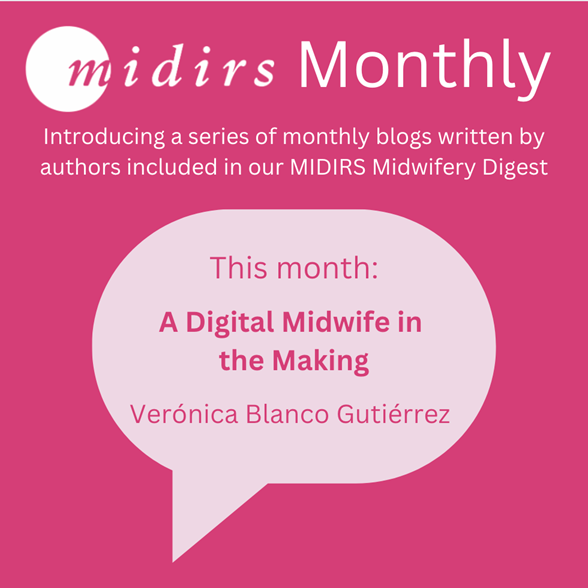MIDIRS Monthly - A Digital Midwife in the Making
By Verónica Blanco Gutiérrez on 09 June 2023

Digital health
Our lives are constantly evolving around the use of technologies and health systems are going through a digital transformation to match current technological demands. This digital transformation is a priority for the NHS and the UK Government (DHSC, 2022; NHS England, n.d.), but what is digital health?
Digital health “is an umbrella term that refers to the use of digital technology to improve the operation and quality of health care systems and services, as well as individual and population health. The topics included within digital health care are extensive, encompassing the collection and use of data, patient-facing apps, electronic systems for prescription, appointments and patient records, and telemedicine” (Hutchings and Morris, 2022). Moreover, digital health and care aims to reduce inefficiencies in the healthcare system, improve access, reduce costs, increase the quality of care, make health services more person-centred, and tailor medicine for every individual needs (Digital Health & Care Innovation Centre, 2023; Ronquillo et al., 2023). However, challenges can arise from the digitalisation of health and care services, such as digital exclusion. This exclusion has the potential to widen the existing health inequality gap, particularly for those populations at risk, such as people with disabilities, older people, people from underrepresented groups and low socio-economic backgrounds, as well as those with limited digital literacy skills (Mistry & Jabbal, 2023). Therefore, it is evident that efforts should be made to achieve an inclusive digital transformation in health and care services.
Digital health in midwifery
The Better Births report (National Maternity Review, 2016) instigated a series of recommendations based on past adverse events with the aim of "delivering safer, more personalised care for all women and every baby, improving outcomes and reducing inequalities". As a result, the Maternity Transformation Programme (NHS England, 2016) was created to achieve the vision outlined in the Better Births report. Moreover, in 2019 the NHS Long Term Plan (NHS, 2019) set out a series of recommendations to improve Maternity and neonatal services. With regards to digital health the NHS Long Term plan recommended "by 2023/24, all women will be able to access their maternity notes and information through their smart phones or other devices" (NHS, 2019, p.47). Hence, NHS Digital ran four digital maternity projects as part of the Harnessing Digital Technology workstream to support NHS England and the NHS Long Term Plan in achieving their objectives (NHS Digital, 2023). These digital projects are the Digital Maternity Interoperability project, to enable an exchange of maternity records between women and clinicians irrespective of their location; the Women's Digital Care Record (WDCR) project, to replace traditional paper notes with digital versions; the Digital Toolset, to support choice and personalisation of care for women; and the Digital Maturity Assessment (DMA), to assist maternity services with their digital progress (NHS Digital, 2023). Within this context of digital transformation of maternity services, the figure of the digital midwife was born to champion and lead the digital change (Eyers, 2021).
My journey into digital health
Last year, I was determined to start a PhD. After trying for a while I was lucky enough to choose between a traditional clinical academic doctoral program and a digital health and care PhD. The decision was tough, as prior to this point I had not formally considered digital health as an option in my career prospects.
Last September I took a career break from my NHS clinical midwife post and I started a 1+3 Digital Health and Care doctoral program at the University of Bristol. The first academic year has been a rollercoaster; I have felt like a fish in the water in some modules, such as those about the ins and outs of the NHS, planning and conducting research in health-related topics and other fields, and reflecting on the ethical aspects of the use of digital technologies in healthcare. Other modules, however, have been challenging and have made me feel literally and genuinely stupid, such as learning programming languages- Python and JavaScript and gaining an understanding of artificial intelligence (AI) and data analytics. Nevertheless, this has been so far an eye-opening experience, providing me with a deeper understanding of what is behind a digital technology. And apparently, stupidity is pretty important in scientific research (Schwartz, 2008), so I can definitely check that box.
If this mental rollercoaster was not enough I also added some other "exciting" parts to this challenge. I commuted daily an average of 1658 km or 1,030 miles approximately per week while also mothering my five-year-old daughter. This massive achievement could not have been possible without a supportive environment and an amazing partner. The point I am trying to make here is that if you are passionate about what you want to achieve and you have good support, nothing is impossible.
Now that I am in the final stages of the master's programme I have three months ahead to develop my own doctoral project. I will be dedicating the next three years of my life to researching the role of social determinants of health on AI-driven CTG intrapartum decision-support tools in term babies. I know this is a bit of a mouthful, but, in summary, I will be investigating whether we could use ethnicity and other non-medical factors that influence health to predict and reduce the risk of perinatal adverse events in women and babies, particularly for those from underrepresented groups. Apart from this heavy AI component, I will also be looking at the human-computer interaction (HCI) between women from underrepresented groups and clinicians when engaging with this type of technology to improve perinatal outcomes. To guide me through this process, I have a team of wonderful supervisors: Professor Kenton O'Hara and Associate Professor Aisling O'Kane from the University of Bristol, and Associate Professor Antoniya Georgieva, from the University of Oxford.
Looking back and reflecting on the past eight months, and despite the mental and physical challenges of undertaking a PhD in a new field, I would definitely do it all over again. Getting out of your comfort zone is scary, makes you feel stupid, shakes your core and makes you question your choices; however, I would encourage every midwife out there to be brave and take on a new challenge.

